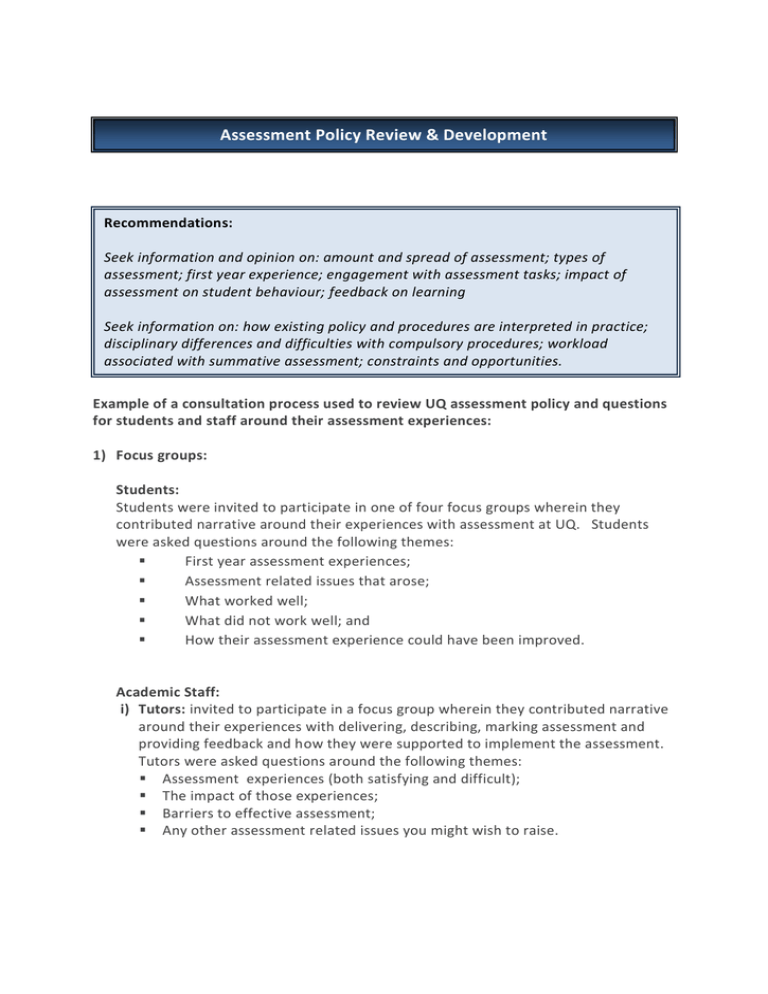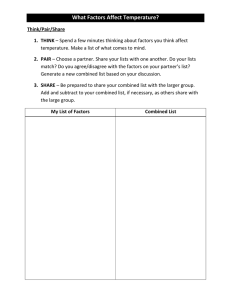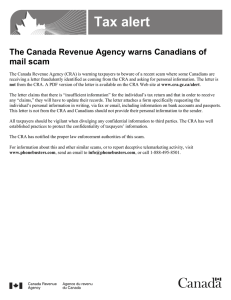Assessment Policy Review & Development
advertisement

Assessment Policy Review & Development Recommendations: Seek information and opinion on: amount and spread of assessment; types of assessment; first year experience; engagement with assessment tasks; impact of assessment on student behaviour; feedback on learning Seek information on: how existing policy and procedures are interpreted in practice; disciplinary differences and difficulties with compulsory procedures; workload associated with summative assessment; constraints and opportunities. Example of a consultation process used to review UQ assessment policy and questions for students and staff around their assessment experiences: 1) Focus groups: Students: Students were invited to participate in one of four focus groups wherein they contributed narrative around their experiences with assessment at UQ. Students were asked questions around the following themes: First year assessment experiences; Assessment related issues that arose; What worked well; What did not work well; and How their assessment experience could have been improved. Academic Staff: i) Tutors: invited to participate in a focus group wherein they contributed narrative around their experiences with delivering, describing, marking assessment and providing feedback and how they were supported to implement the assessment. Tutors were asked questions around the following themes: Assessment experiences (both satisfying and difficult); The impact of those experiences; Barriers to effective assessment; Any other assessment related issues you might wish to raise. Tutors from across the university were invited to engage in a workshop along with course coordinators to analyse the raw narrative that came from the focus groups for themes, issues and opportunities and resolved/unresolved issues. ii) Course coordinators: invited to participate in focus groups wherein they contributed narrative around their experiences with the design, implementation of assessment and the factors that were perceived to support or constrain their practice. The role of policy in guiding their practice was also explored. Course coordinators were asked questions around the following themes: Positive experiences : to describe a program of assessment or piece of assessment that worked well. How did that piece or program of assessment come about? What made it work well? (eg qualities of the assessment) How did you know it worked well? (for you and for your students) What helped you to make this assessment experience successful? Negative experiences: To relate an experience with assessment, where there was something that constrained or prevented ideal practice. What did you want to do? Why did you want to do it? What stopped or prevented you? What would have helped to make your experience more successful? Other assessment issues: Are there any other issues you wish to raise about assessment? What are you trying to achieve through assessment? How do you integrate assessment into your courses? What sort of assistance does the university provide you around assessment? Who or where do you go for advice and guidance about assessment if you need it? 2) Interviews with long serving academic staff members Individual interviews were conducted with 7 long-serving academic staff members at the University of Queensland. The Length of academic appointment at UQ held by those interviewed ranged from 17 – 28 years. Themes explored during interviews: How has assessment practice changed? Factors perceived to contribute to changes in practice Attitudes to criterion-referenced assessment The student experience today Assessment challenges/constraints If you could change something about assessment Familiarity with UQ Assessment Policy How could UQ assessment policy be improved? How should future policy look? Approaches to marking: use of criteria and standards to grade work Moderation practices 3) Staff survey on assessment practices at UQ Course coordinators from across the university were invited to participate in an online staff survey on assessment practices at UQ. The survey explored themes around staff assessment practices; perspectives on assessment at UQ; definition of criterion referenced assessment (CRA); perspectives on CRA, how it’s implemented and confidence levels with implementation of CRA; other comments. See below for an outline of survey questions. Staff survey on assessment at the University of Queensland Purpose of the survey. This survey forms part of an ALTC-funded project entitled Assessment policy and impact on practice: Sharpening the policy review process in Australian Universities (PP8-874). The project is led by members of UQ’s Assessment Sub-committee. The survey will provide data which will assist the UQ assessment sub-committee in reviewing assessment policies. Thank you for participating. By completing this survey you are consenting to the use of your responses to inform this project. Your responses will remain anonymous. Human Ethics Clearance: This study adheres to the Guidelines of the ethical review process of The University of Queensland. Ethics Clearance No.2009000451. Whilst you are free to discuss your participation in this study with project staff (co ntactable on email at c.robb@uq.edu.au), if you would like to speak to an officer of the University not involved in the study, you may contact the Ethics Officer on 3365 3924 Background Information. First, so that we can describe our sample of respondent s, please indicate the following: Your Faculty Arts BEL EAIT Health Sciences NRAVS Science SBS Your School Animal Studies Architecture Biological Sciences Biomedical Sciences Business Chemical Engineering) Chemistry and Molecular Biosciences Civil Engineering Dentistry Earth Sciences Economics Education English, Media Studies and Art History Geography, Planning and Environmental Management Health and Rehabilitation Sciences History, Philosophy, Religion and Classics Human Movement Studies Information Technology and Electrical Engineering Integrative Systems Journalism and Communication Land, Crop and Food Sciences Languages and Comparative Cultural Studies Law Mathematics and Physics Mechanical and Mining Engineering Medicine Music Nursing and Midwifery Pharmacy Political Science and International Studies Population Health Psychology Social Science Social Work and Human Services Tourism Veterinary Science What are the major programs into which you teach? At what level(s) do you teach? (You may tick multiple items) 1st year 2nd year 3rd year 4th year postgraduate coursework Other (Please specify) ____________________ Assessment Practice: These questions ask what you do in your courses in terms of assessment On average, how many assessable items do you set for a #2 course? 1 2 3 4 5 6 or more (Please specify) ____________________ What types of assessment items do you set most frequently? (You may tick multiple items) final exams mid semester exams in class or online tests or quizzes essays lab, research or field reports portfolios oral presentations tutorial/class attendance tutorial/class/blog participation group assignments performance or exhibition journal or reflective log practical competencies econference case reports other (please specify) ____________________ If you set exams, what are the major types of exams/exam questions that you use? multiple choice questions short answer questions essays computations practical problem solving case analysis performance other (Please specify) ____________________ Do you set any purely formative assessment that provides feedback to students on their learning without contributing to their final grade? No Yes If yes, please describe In the design and implementation of your assessment, how much are you guided by... 1 = Not at all and 5 Very much … 1) 2) 3) 4) 5) Professional accreditation requirements The University's Assessment policy (eg on amount and spread of assessment) The University's Graduate Attribute Policy Local School policy (eg on amount and spread of assessment) 3) 4) 5) 1=never; 2 =rarely; 3 = sometimes; 4=usually; 5 = always How often do you have a colleague or peer within your school... 1) 2) Review the design of your assessment and exams Review your marking and grading How often do you have a colleague or peer outside your school... 1) 2) 3) 4) (5) Review the design of your assessment and exams Review your marking and grading Perspectives on assessment: These questions ask you for your opinion about a range of assessment issues Please indicate how much you agree or disagree with the following statements about assessment: 1= strongly disagree; 2 = disagree; 3 = neither agree nor disagree; 4 = agree; 5 = strongly agree 1) 2) 3) 4) 5) Class sizes influence my selection and design of assessment tasks Class sizes constrain good assessment Group work is a useful way to reduce marking in large classes Concerns about plagiarism influence my selection of assessment tasks Concerns about attrition have lowered standards There is pressure not to fail students More students get higher grades these days There is not enough time allowed for marking at the end of the semester (8) I would assess differently if more resources (eg, tutors) were available Assessment is adequately resourced Electronic Course Profiles (ECPs) provide a useful template for describing assessment requirements The UQ policy Assessment (HUPP 3.30. 1) is helpful More integrated assessment across courses within a program would be valuable We should have less summative assessment (that contributes to final grades) and more formative feedback to students on the progress of their learning Students at UQ are over assessed Students at UQ won't do work unless it is assessed The amount and type of assessment is a factor that influences students' course selection Mandatory student evaluations (of courses and of teaching, ie. SECaTs) are a disincentive to innovate in assessment There's no incentive for innovation in assessment I should be able to use 100% final assessment in my courses if I prepare students appropriately There should be constraints on the number of items of assessment you can set per course The policy requiring more than one type or form of assessment per course is appropriate The University provides useful professional development around assessment I have undertaken professional development around assessment In 1997, UQ made a policy decision to move to Criterion Referenced Assessment (CRA). In your own words, tell us briefly what you understand is meant by Criterion Referenced Assessment. Implementation: These questions ask about the way you implement CRA . Think about the criteria you set for your assessment items. How do you describe standards against which achievement on those criteria will be judged? I write explicit standards for each criterion for each assessment piece (eg High standard: Writes very fluently with a cogent argument ... Low standard, Weak argument and poor presentation) I rely on the University's generic grade descriptors (for grades of 1 to 7) as the standards for each criterion I don't describe standards -- I just give a mark for each criterion Other (Please specify) ____________________ How do you aggregate achievement on individual assessment items to determine final course grades? I aggregate individual marks or percentages that map onto the University's 1 -7 grades I aggregate, review or profile individual grades (1-7) that accord with the University's 1 -7 grades I aggregate or review individual achievement on some other predetermined standards (eg, A to E, Poor to Excellent) and map this onto the University's 1 - 7 grades. Other (Please describe) ____________________ How much you agree or disagree with the following statements about implementation of CRA? 1= strongly disagree; 2 = disagree; 3 = neither agree nor disagree; 4 = agree; 5 = strongly agree ) 5) Although I use CRA, I still feel pressured to mark to a bell curve I have been required to adjust final grades that were based on CRA If I use CRA and I'm not satisfied with the grade distribution, I revise the criteria and standards before the next offering of the course If I use CRA and I'm not satisfied with the grade distribution, I adjust the grades Confidence: These questions ask you to indicate how confident you are using CRA As a UQ course coordinator, how confident are you that you are... 1 = Not at all confident and 5 = Very confident 1 2 3 4 5 Using criterion referenced assessment to its best advantage? Identifying appropriate criteria for assessment tasks? Setting appropriate standards against which to determine achievement on those criteria? Engaging students with the criteria and standards you set for your assessment tasks? Making assessment judgements that are transparent to students? Providing meaningful feedback to students on their assessment? Awarding grades for your students that are consistent with he University's grade descriptors? Making assessment judgements that are consistent from student to student? Making assessment judgements that are consistent from year to year? Making assessment judgements that are consistent with those of other assessors in your course(s)? Making assessment judgements that are consistent with judgements made in other courses of a similar discipline/year level? Perspectives on CRA: These questions ask you for your opinion about CRA Please indicate how much you agree or disagree with the following statements about CRA as an approach to assessment (eg as distinct from norm referenced assessment in which students are assessed against one another on a bell curve). In my opinion, CRA... 1= strongly disagree; 2 = disagree; 3 = neither agree nor disagree; 4 = agree; 5 = strongly agree 1 2 3 4 5 2 Discourages competition between students for grades Provides students with clear communication about assessment expectations Enhances student motivation for learning Makes students more demanding in terms of information about assessment Discourages student originality and innovation Increases student anxiety about addressing assessment requirements correctly Provides students with rich feedback to assist their learning Improves consistency of judgements for individual markers Improves consistency of judgements between teams of markers Improves the standard of students' work, overall Improves the standard of work for weaker students Leads to inappropriate grade inflation Makes course coordinators think more carefully about the design of their assessment Encourages originality in the design of assessment Makes marking too rigid Prevents holistic judgements about the standard of an assessment item (17) Is fully accepted at UQ Any Other Comments Please provide below, any other thoughts or comments about criterion referenced assessment (CRA) and/or the way assessment is implemented at UQ that you consider would be useful to the UQ Assessment Sub-committee. You may also use this space to comment on or clarify your responses to any items on this survey. THANK YOU for completing the survey. Your responses will be of great assistance to UQ Assessment Sub-committee



